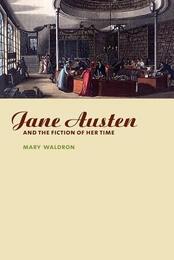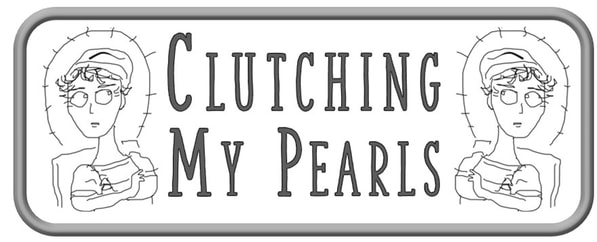| Clutching My Pearls is my ongoing blog series about Jane Austen’s beliefs and ideas, as based on her novels. Some of Jane Austen's admirers are eager to find ways to acquit her of being a woman of the long 18th century. Further, for some people, reinventing Jane Austen appears to be part of a larger effort to jettison and disavow the past. Click here for the first in the series. |
| "[Austen's] novels dramatize not social ills, but individual failings: vanity, greed, pride, selfishness, arrogance, folly. For all her humor and wit, she was a rigorous moralist. Adult life demanded adult behavior: self-awareness, propriety, kindness, good sense." --Robert Garnett |
| "Pictures of perfection, as you know, make me sick and wicked"  In previous posts, I've discussed why I disagree with the notion that Austen promoted politically radical ideas. I’ve quoted and re-quoted that wisdom from Professor Garnett, above, because I think he gets at the heart of Jane Austen. Of course Austen’s novels featured love stories -- they were novels, after all, not collections of sermons or texts on seafaring. However, she wasn't all about romance, nor was she trying to upend the social order. She believed in virtue, self-knowledge and self-control -- in other words, morality. However, after reading Mary Waldron’s Jane Austen and the Fiction of Her Time, I am compelled to add a big “BUT." I think Waldron is correct that Austen did not care for authors who bashed their readers over the head with their morality and their beliefs. Her aversion to this writing style wasn't because she thought preachiness was bad for book sales. For example, she was critical of Hannah More and Mary Brunton, who easily outsold her (in her lifetime.) (However popular in their day, Hannah More's Coelebs in Search of a Wife and Mary Brunton’s Self-Control are best known today for what Austen said about them in her private letters, a pretty amazing reversal of fame.) |
 Coelebs was so popular it spawned several sequels and imitations
Coelebs was so popular it spawned several sequels and imitations Very little happens to, or between, Charles and Lucilla. Most of the action involves side characters about whom Mr. Stanley moralizes. He talks about his neighbours to illustrate his opinions about religion and raising children, which, under any other circumstances, would make him the most judgmental, inveterate old gossip you’ve ever met in your life.
I actually rather like Hannah More’s writing – she could turn a deft phrase -- and I admire her as a self-made woman, an educator, an abolitionist, and a philanthropist. But however much I admire More, Coelebs is not her best work, best-seller though it was. Coelebs may be a novel, technically, but all the characters, especially Lucilla’s father, are just animated points of view, propounding More's doctrines of Evangelical Anglicanism. (For more about Coelebs, check out this helpful blog). (I've written another comparison of Mansfield Park and Coelebs in this post).
Austen could not accept making the story in the novel subservient to the moralizing, because you end up with a story inhabited by people who bear no relation to real, fallible, humans. “Pictures of perfection, as you know,” she told her niece, “make me sick and wicked.” She thought that faultless heroines like Lucilla Stanley were too far removed from reality, sometimes comically so. And when you start out with perfect characters, there is no opportunity for character development.
 Laura Montreville threatened by Captain Hargrave in "Self Control"
Laura Montreville threatened by Captain Hargrave in "Self Control" In an early chapter of Brunton's Self-Control, the virtuous Laura Montreville has fallen for the passionate Captain Hargrave. She's horrified when she realizes he's not proposing marriage to her, but asking her to be his mistress.
“No words can express her feelings, when, the veil thus rudely torn from her eyes, she saw her pure, her magnanimous Hargrave—the god of her idolatry—degraded to a sensualist, a seducer. Casting on him a look of mingled horror, dismay, and anguish, she exclaimed, “Are you so base?” and, freeing herself, with convulsive struggle, from his grasp, sank without sense or motion to the ground."
Laura shows herself more capable of self-preservation when Hargrave has her abducted and taken by ship to Canada. She stays calm when she hears a rattlesnake in the forest, and she escapes the clutches of her would-be ravisher by paddling down-river in a canoe. Believing that she has perished in the river, Hargrave kills himself in remorse.
In the second edition of Self-Control, Mary Brunton acknowledged that: “objections [have been] stated against the probability of some of the incidents. Had these censures been pointed at the [moral] lessons which the tale was intended to convey, the Author would have felt it was her duty, as well as her earnest desire, to remove them.”
Austen said of this book, “I am looking over Self Control again, & my opinion is confirmed of its’ being an excellently-meant, elegantly-written Work, without anything of Nature or Probability in it. I declare I do not know whether Laura’s passage down the American River, is not the most natural, possible, every-day thing she ever does.”
When we compare Austen's novels to those of her contemporaries, we see that she is not unique as a moralist, but she is uniquely good as an author. Her prose is delightful, soothing, elegant, witty, almost hypnotic in its power to draw you in. Her situations are not fantastical. Her scope is domestic and intimate. Her moralizing is gentle, her authorial voice is detached, and her ideas are presented through an imaginative array of different and unique characters.
Instead of Laura and Lucilla, Austen gave the world the delightful, but fallible, Elizabeth Bennet and Emma Woodhouse, and the naïve Catherine Morland. They want to do the right thing, try to do the right thing, but make mistakes along the way. Anne Elliot quietly mourns the man she lost, and Fanny Price… well… Fanny Price -- is she a picture of perfection? We’ll take her up in the coming blog posts.
| Many actors say that playing the conniving villain is more fun than playing the upright hero, and I think it is very entertaining to write villains as well! I enjoyed writing a short story based on Persuasion from the point of view of Mrs. Clay, the artful gold-digger, which appears in the Quill Ink anthology, Rational Creatures. Hannah More's novel Coelebs was so popular that it spawned many imitations. I discuss one of them here. |


 RSS Feed
RSS Feed